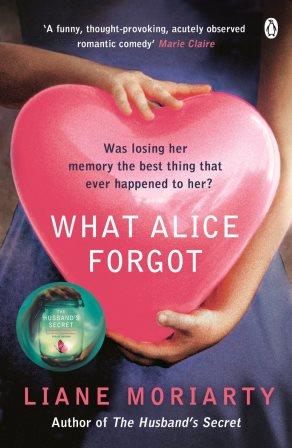
Forgetting what you did on a drunken night out is bad enough.
Forgetting what you’ve done for the last ten years must be terrifying. This is the problem facing Alice Love in Liane Moriarty’s intriguing novel, ‘What Alice Forgot’.
What’s it about?
Alice bumps her head at the gym and is utterly astonished to find herself there at all.
‘The gym? Alice didn’t go to gyms. Had she woken up drunk in a gym?’
She believes she’s still a fun-loving twenty-nine year old with a lovely husband and a growing baby bump. Unfortunately, no one else has lost their memory and Alice quickly discovers that her husband hates her, her sister is barely talking to her, and the baby bump is now a bundle of misery who seems to detest her. Just who has Alice become in these past ten years? And is it too late to change the path she’s on?
What’s it like?
Amusing and well-constructed. Despite the seriousness of her situation (Alice is horrified that she’s managed to forget the existence of her three children), Alice’s instinctive responses are mildly comedic as she tries to unpick just who is she and what she’s done.
‘It had seemed so clear. She brightened. That’s why everyone had seemed sympathetic when Gina’s name came up – because she was dead! There had been no affair at all! Now she was filled with relief…And if there had been no affair, maybe Gina had been quite nice. So it was sort of terrible that she was dead.’
The premise is interesting and well-developed. Alice is a sympathetic character and it’s fascinating to see her start to understand where her marriage went wrong. But is it too late to put it right? I liked the way Alice’s relationships became more developed towards the end, and the blame for various changes was no longer laid solely at Alice’s feet.
The ending is a little uneven; I would have preferred more showing and less telling, but the way Moriarty plays with possibilities makes it very much a story for grown-ups rather than simple wish fulfilment.
What Moriarty forgot
Just like Moriarty’s later book, ‘The Husband’s Secret‘, there’s more than one story developing here.
While Alice is trying to remember who she is, her sister Elisabeth is struggling with fertility problems and feels her own marriage may be near breaking point. This is an incredibly sad storyline which is developed in just enough detail through diary entries (supposedly written as ‘homework’ for Elisabeth’s counsellor) to really engage readers and deliver what is actually a more emotionally charged story than Alice’s. (We know Alice will get some kind of happy ending, whether or not it’s the one her newly-29-again self would want. We don’t know whether or not Elisabeth will.)
Meanwhile their honorary grandmother, Frannie, is exploring her thoughts on euthanasia (despite being perfectly well) and experiencing difficulties with a new resident at her retirement home. This storyline felt seriously underdeveloped and irrelevant to me; the story arc is completely predictable and didn’t interest me at all. Frannie’s story is recounted in the form of a blog and the comments left there, which is certainly very modern, but not actually as insightful as a diary or a straightforward third person narration.
Final thoughts
I loved Alice’s story and felt that it worked well with Elisabeth’s story as the more darkly emotional one. I’m glad I read the book and am sure I could enjoy reading it again in the future.
However, I couldn’t see the point of Frannie featuring in the book at all and found myself skimming every ‘Grand Musings of a Great-Grandmamma!’. This doesn’t significantly detract from the rest of the book as there aren’t that many entries and they’re fairly short, but for me this only emphasised their insignificance, and in contrast to the emotional insights into life with infertility, and life in a busy family, there was no insight or discussion of euthanasia at all. I’m just not sure why Frannie was included, which reminds me of the reservations I had about the use and development of the three focal characters in ‘The Husband’s Secret’.
I’ve already started to read Moriarty’s ‘Big Little Lies’ and, in a slight change of focus, the blurb for this book actually refers to three couples, (‘What Alice Forgot’ and ‘The Husband’s Secret’ only refer to the main character in the blurb), so I’m hoping that this time all three will be well developed enough to sustain my interest.